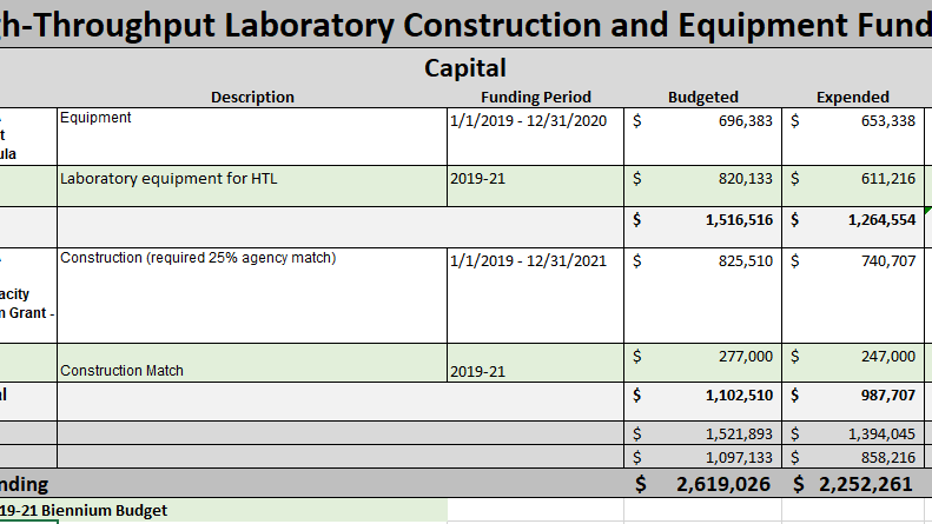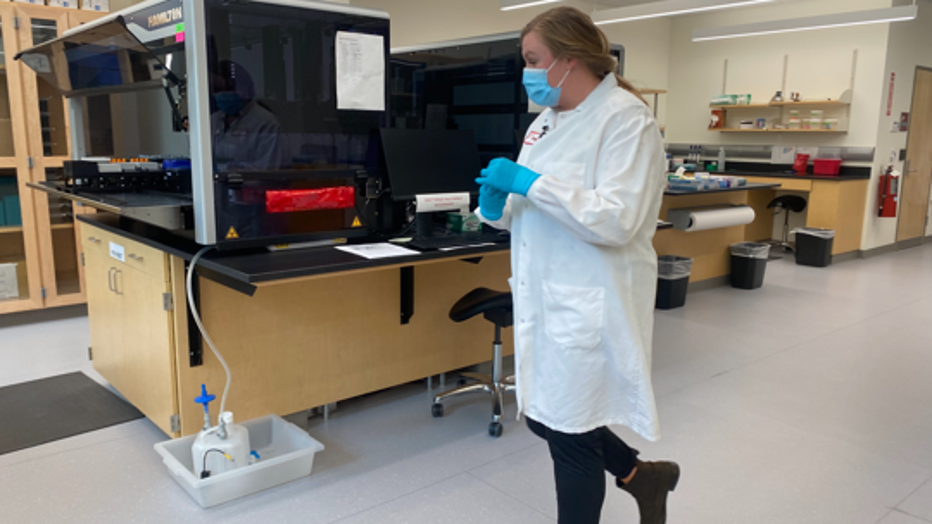Washington Crime Lab on track to clear backlog of rape kits in next 3 months

WA crime lab on track to clear backlog of rape kits
The crime lab has been using a two-pronged approach to get this done, including outsourcing older kits to out-of-state labs for testing. However, it's the addition of three new machines that has drastically sped up the testing process for new kits coming in.
VANCOUVER, Wash. - The Washington State Crime Lab reports that by the end of this year, scientists should be able to completely clear out the massive backlog of rape kits that have been sitting on evidence shelves, some for decades.
The crime lab has been using a two-pronged approach to get this done, including outsourcing older kits to out-of-state labs for testing. However, it's the addition of three new machines that has drastically sped up the testing process for new kits coming in.
The team of scientists at the Vancouver crime lab, including Dana Yenko, make up a human-robotics workforce.
"We want to give you the best, most objective test possible," said Yenko.
The combination of mind and machine has drastically reduced the turnaround time for testing sexual assault kits. Upwards of 125 kits come into the lab monthly. The current processing time is now at just over a month, compared to what could have been up to a year or longer in the past.
"The goal is about that 45 days to [Combined DNA Index System] (CODIS) upload ," said Trevor Chowen, forensics scientist and supervisor of the DNA section at the Vancouver Crime Lab.
That's a far cry from 2017, when the Washington State Patrol estimated there were roughly 12,000 outstanding sexual assault kits languishing on evidence shelves statewide.
PREVIOUS COVERAGE: Report: Washington cleared one-third of its untested rape kits, but large backlog remains
Today, only around 1,615 of the historical kits collected before late July 2015 remain. The crime lab believes this backlog will drop to zero by the end of the year.
"We are getting down in the home stretch, we are getting results returned on those last batches of cases.," said Kristina Hoffman, the lab's DNA Operations Manager.
That's all the more remarkable because the lab is also simultaneously keeping up with new incoming kits, thanks to three state-of-the-art robotic work stations.
"The whole upstairs area here is the DNA labs," said Jason Dunn, the Laboratory Manager.
Dunn gave FOX 13 News a tour of the newly constructed home of the new Hamilton Robots, built in 2020 for roughly $2.2 million.
"In July 2020, the WSP increased its capacity for DNA testing in the Vancouver Crime Lab by converting a previously empty, unfinished space into usable laboratory space dedicated for the processing of sexual assault kits," said Chris Loftis, a spokesperson for the Washington State Patrol. "This facility expansion was funded through a combination of a federal grant award and state funds."
RELATED: Ending the backlog: How Washington state is working through 10,000 untested sexual assault kits
Loftis says a breakdown of the numbers shows the total construction costs at $987,707 and total equipment costs at $1,264,554.
A more thorough breakdown of the funding is shown below:

"Hamilton AutoLys STAR robotic workstations in the 4+4 configuration. The purchase of each workstation was approximately $258,000," said Loftis. "The cost of each included the instrumentation, consumables, extended warranty, installation, training, method programming, and on-site applications engineering support."
In the new lab, the new robots rapidly test up to 80 samples at a time.
"The goal with these instruments is to try to automate as much as possible, " said Dunn.
The entire process can be finished in two to four hours.
"They are designed to help streamline the process, the lab work being automated, while at the same time giving us more time at our desk to do the analysis and write the report," said Yenko.
Because of the Hamilton Robot's ability to process large batches of samples at once, it has now freed up scientists to perform other DNA casework; such as analyzing and reviewing data and performing statistical analysis, preparing reports or sampling more evidence.

"Probably by the end of the year, I would expect we would be at full capacity.," said Chowen.
"The robots automate some of the laboratory processing required in order to generate a DNA profile; however, the scientists make decisions on what samples are tested and make critical decisions on how a sample is processed," said Loftis.
"That’s why I got into this field, because I really like we can give answers," said Yenko.
She explained why it's so satisfying to be part of the team that is working to make the backlog of sexual assault kits a thing of the past.
"I think that gives closure, and that gives answers to the people that these crimes impact most," said Yenko.

The Washington State Patrol reports that eligible DNA profiles have been uploaded, resulting in 1,318 hits to individuals and 280 hits to another case.
Eventually, Dunn says the lab would also like to set up a system in which the robots can help with the actual DNA extraction, which is the process in which chemicals are added, breaking open the cells in the sample, and releasing and purifying the DNA. He says they still need to work out some challenges with that process in order to reach that goal.
The sexual assault kits from nearly every law enforcement agency in the state are now being sent to the Vancouver lab. By 2024, the goal is to be able to accommodate testing for all agencies.
As of June 30th Loftis said there were around 1,207 sexual assault kits that were in the process of being tested and/or reviewed, 195 from newer cases (2022-present), and 1,012 are from inactive cases with kits collected on or after July 24, 2015.
At that time, he said there were 1,615 of the historical kits, collected before July 24, 2015, that were at some point in the process of being tested or reviewed.
"As of July 1st, the sexual assault kits from every police agency in the state will be coming to the Vancouver lab, except for Seattle PD, and King County Sheriff's Office, and we are hoping to have them sent to Vancouver by the end of the year," said Loftis.

